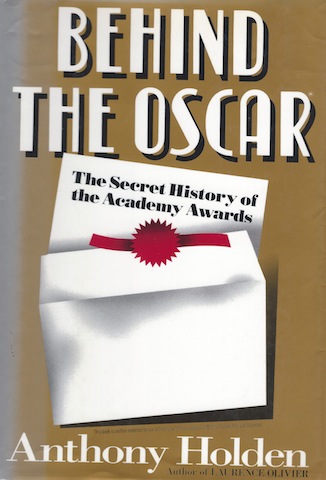Sunday, March 20, 1994.
BEHIND THE OSCAR: THE SECRET HISTORY OF THE ACADEMY AWARDS. By Anthony Holden. Viking, 1993. 672 pp., Illus. $29.99.
LOVE THOSE OSCARS? So did Laurence Olivier.
The recipient of a Lifetime Achievement Award in 1978, Lord Larry ignored his cue cards and launched into a mock Shakespearean soliloquy praising the American motion picture academy and all its works.
"From the top of this moment, in the solace, in the kindly emotion that is charging my soul and my heart at this moment," England's greatest actor gushed, "I thank you for this great gift which lends me such a very splendid part in this, your glorious occasion."
Hate those Oscars? So does George C. Scott.
The winner of the 1970 best actor award for his portrayal of a Second World War tank commander named Patton, Scott refused the nomination and ignored his own victory. The very process, he said, is "offensive, barbarous and innately corrupt."
Love and hate them? You're just like Marlon Brando.
The winner of the 1954 best actor award (for On the Waterfront), America's finest actor not only turned up at the ceremonies in a proper dinner jacket, but hung around to pose for some goofy, good-natured publicity photos with show host Bob Hope.
Eighteen years later, Brando responded to his nomination (for 1972's The Godfather) with a Scott-like statement rejecting the honour. When his name came out of the envelope anyway, academy members were treated to a speech from Brando's representative, a young woman in traditional Native American dress who identified herself as Sacheen Littlefeather.
By now it should be clear that only those utterly indifferent to "the most potent publicity gimmick any industry every devised for itself," will be able to resist Anthony Holden's exhaustively researched Behind the Oscar. A London-based entertainment writer (and Olivier biographer), Holden details Oscarmania with the bemused detachment of a friendly visitor to the U.S. film capital.
His account includes a history of an organization originally conceived as an alternative to film industry unionization, and follows its emergence as the company town's own Chamber of Commerce. In 1948, he tells us, Hollywood's studios withdrew financial support from the academy with an incredible (and incredibly revealing) joint statement that said "the companies should not be in a position where they can be accused of subsidizing an artistic and cultural force."
Once a Washington corespondent for The Observer, Holden is particularly interested in how Oscars are won. He examines the modern campaigns "for consideration" that occasionally cost more than the salaries of the actors being promoted, or even the budgets of the films being promoted.
Culled from a wide range of published sources, his book doesn't quite live up to the promise of a "secret history." Even so, its extensive appendices offer an impressive display of number crunching and factoid assembly.
Originally published in 1993, and now available [1994] in a trade paperback edition, Behind the Oscar proves that Lord Larry was right to love it, George C. was right to hate it and Marlon was right to agree with them both.
The above is a restored version of a Province review by Michael Walsh originally published in 1994. For additional information on this archived material, please visit my FAQ.
Afterword: Last Monday (January 18) actress Jada Pinkett Smith and director Spike Lee departed from the script. In separate announcements, the two cinema celebrities said they would not be attending the Academy Awards ceremony scheduled for February 28, 2016. Timed to coincide with the U.S. Martin Luther King Jr. Day statutory holiday, Lee's Instagram posting took issue with the lack of diversity — "another all-white ballot" — in this year's Oscar nominations. Almost immediately the hashtag #OscarsSoWhite was trending on social media. The 98-year-old Academy, used to mostly reverential coverage, saw the infotainment focus of the corporate media sliding off message. Suddenly, the 88th edition of history's most successful advertorial was threatened with a boycott.
On Thursday night (Janurary 21), in full damage-control mode, the organization's board of governors "unanimously approved a series of sweeping and historic changes designed to diversify its membership." Critics familiar with the history of the self-named "Academy" remain skeptical, doubting that the aging leopard can change its spots. At 58, Lee is an old troublemaker, a writer-director remembered for rocking the Hollywood boat with such films as Do the Right Thing (1989) and Malcolm X (1992). Pinkett Smith, 44, represents a new generation. Together with her husband, Will Smith, she uses her celebrity to further progressive social and political causes. Their attack on the credibility of the Oscars remains breaking news.
